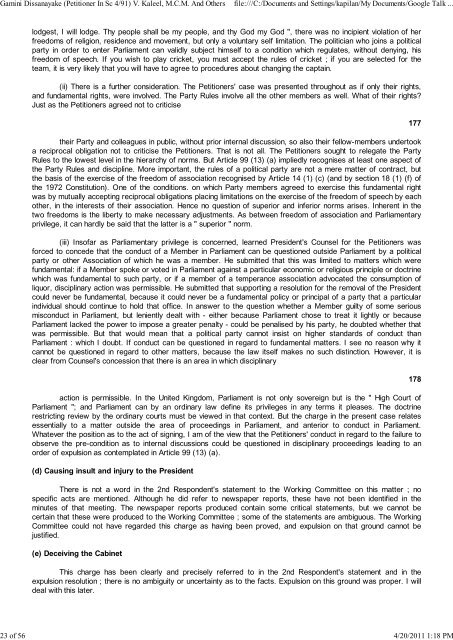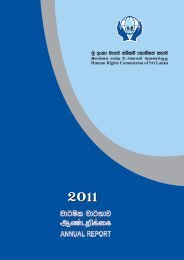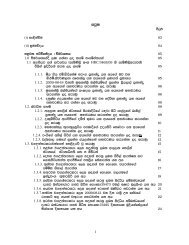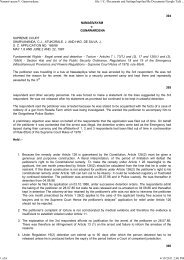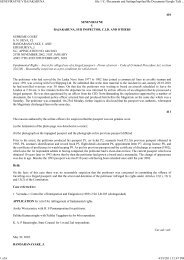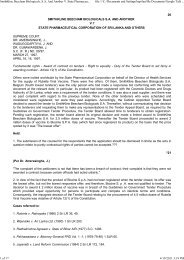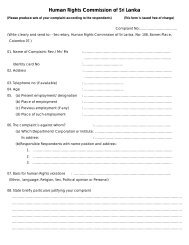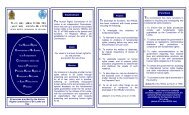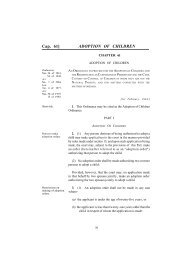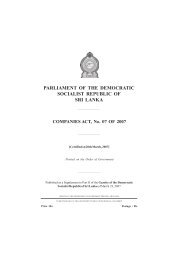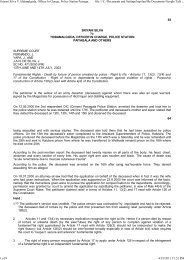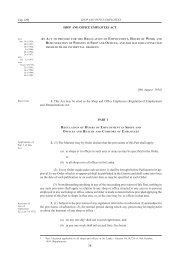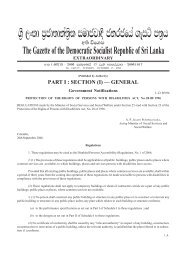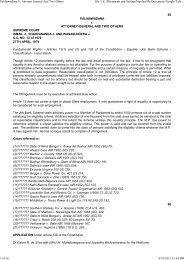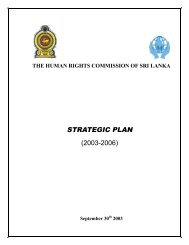Gamini Dissanayake (Petitio... - Human Rights Commission of Sri ...
Gamini Dissanayake (Petitio... - Human Rights Commission of Sri ...
Gamini Dissanayake (Petitio... - Human Rights Commission of Sri ...
Create successful ePaper yourself
Turn your PDF publications into a flip-book with our unique Google optimized e-Paper software.
<strong>Gamini</strong> <strong>Dissanayake</strong> (<strong>Petitio</strong>ner In Sc 4/91) V. Kaleel, M.C.M. And Others file:///C:/Documents and Settings/kapilan/My Documents/Google Talk ...<br />
lodgest, I will lodge. Thy people shall be my people, and thy God my God ", there was no incipient violation <strong>of</strong> her<br />
freedoms <strong>of</strong> religion, residence and movement, but only a voluntary self limitation. The politician who joins a political<br />
party in order to enter Parliament can validly subject himself to a condition which regulates, without denying, his<br />
freedom <strong>of</strong> speech. If you wish to play cricket, you must accept the rules <strong>of</strong> cricket ; if you are selected for the<br />
team, it is very likely that you will have to agree to procedures about changing the captain.<br />
(ii) There is a further consideration. The <strong>Petitio</strong>ners' case was presented throughout as if only their rights,<br />
and fundamental rights, were involved. The Party Rules involve all the other members as well. What <strong>of</strong> their rights?<br />
Just as the <strong>Petitio</strong>ners agreed not to criticise<br />
their Party and colleagues in public, without prior internal discussion, so also their fellow-members undertook<br />
a reciprocal obligation not to criticise the <strong>Petitio</strong>ners. That is not all. The <strong>Petitio</strong>ners sought to relegate the Party<br />
Rules to the lowest level in the hierarchy <strong>of</strong> norms. But Article 99 (13) (a) impliedly recognises at least one aspect <strong>of</strong><br />
the Party Rules and discipline. More important, the rules <strong>of</strong> a political party are not a mere matter <strong>of</strong> contract, but<br />
the basis <strong>of</strong> the exercise <strong>of</strong> the freedom <strong>of</strong> association recognised by Article 14 (1) (c) (and by section 18 (1) (f) <strong>of</strong><br />
the 1972 Constitution). One <strong>of</strong> the conditions. on which Party members agreed to exercise this fundamental right<br />
was by mutually accepting reciprocal obligations placing limitations on the exercise <strong>of</strong> the freedom <strong>of</strong> speech by each<br />
other, in the interests <strong>of</strong> their association. Hence no question <strong>of</strong> superior and inferior norms arises. Inherent in the<br />
two freedoms is the liberty to make necessary adjustments. As between freedom <strong>of</strong> association and Parliamentary<br />
privilege, it can hardly be said that the latter is a " superior " norm.<br />
(iii) Ins<strong>of</strong>ar as Parliamentary privilege is concerned, learned President's Counsel for the <strong>Petitio</strong>ners was<br />
forced to concede that the conduct <strong>of</strong> a Member in Parliament can be questioned outside Parliament by a political<br />
party or other Association <strong>of</strong> which he was a member. He submitted that this was limited to matters which were<br />
fundamental: if a Member spoke or voted in Parliament against a particular economic or religious principle or doctrine<br />
which was fundamental to such party, or if a member <strong>of</strong> a temperance association advocated the consumption <strong>of</strong><br />
liquor, disciplinary action was permissible. He submitted that supporting a resolution for the removal <strong>of</strong> the President<br />
could never be fundamental, because it could never be a fundamental policy or principal <strong>of</strong> a party that a particular<br />
individual should continue to hold that <strong>of</strong>fice. In answer to the question whether a Member guilty <strong>of</strong> some serious<br />
misconduct in Parliament, but leniently dealt with - either because Parliament chose to treat it lightly or because<br />
Parliament lacked the power to impose a greater penalty - could be penalised by his party, he doubted whether that<br />
was permissible. But that would mean that a political party cannot insist on higher standards <strong>of</strong> conduct than<br />
Parliament : which I doubt. If conduct can be questioned in regard to fundamental matters. I see no reason why it<br />
cannot be questioned in regard to other matters, because the law itself makes no such distinction. However, it is<br />
clear from Counsel's concession that there is an area in which disciplinary<br />
action is permissible. In the United Kingdom, Parliament is not only sovereign but is the " High Court <strong>of</strong><br />
Parliament "; and Parliament can by an ordinary law define its privileges in any terms it pleases. The doctrine<br />
restricting review by the ordinary courts must be viewed in that context. But the charge in the present case relates<br />
essentially to a matter outside the area <strong>of</strong> proceedings in Parliament, and anterior to conduct in Parliament.<br />
Whatever the position as to the act <strong>of</strong> signing, I am <strong>of</strong> the view that the <strong>Petitio</strong>ners' conduct in regard to the failure to<br />
observe the pre-condition as to internal discussions could be questioned in disciplinary proceedings leading to an<br />
order <strong>of</strong> expulsion as contemplated in Article 99 (13) (a).<br />
(d) Causing insult and injury to the President<br />
There is not a word in the 2nd Respondent's statement to the Working Committee on this matter ; no<br />
specific acts are mentioned. Although he did refer to newspaper reports, these have not been identified in the<br />
minutes <strong>of</strong> that meeting. The newspaper reports produced contain some critical statements, but we cannot be<br />
certain that these were produced to the Working Committee ; some <strong>of</strong> the statements are ambiguous. The Working<br />
Committee could not have regarded this charge as having been proved, and expulsion on that ground cannot be<br />
justified.<br />
(e) Deceiving the Cabinet<br />
This charge has been clearly and precisely referred to in the 2nd Respondent's statement and in the<br />
expulsion resolution ; there is no ambiguity or uncertainty as to the facts. Expulsion on this ground was proper. I will<br />
deal with this later.<br />
23 <strong>of</strong> 56 4/20/2011 1:18 PM<br />
177<br />
178


